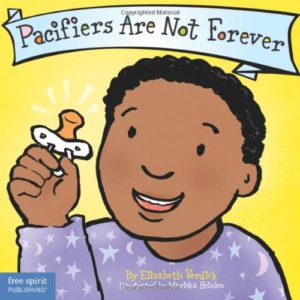 The dummy, the soother, whatever name you prefer to call it, it’s that time- honoured baby accessory and valued tool. At one point or another, most children have had a dummy in their mouths, to comfort or calm them. Some children really “take” to their dummy and can find it very difficult to part with it; others show little interest despite exposure and many attempts by parents to use one to help their baby settle.
The dummy, the soother, whatever name you prefer to call it, it’s that time- honoured baby accessory and valued tool. At one point or another, most children have had a dummy in their mouths, to comfort or calm them. Some children really “take” to their dummy and can find it very difficult to part with it; others show little interest despite exposure and many attempts by parents to use one to help their baby settle.
But why do we really give dummies to babies? From the perspective of a Speech and Language Therapist, dummies have a valid function outside of soothing a child. Did you know that dummies, when used sparingly, can even help babies to develop their mouth and oral skills for breathing and speaking? During a baby’s early months, a dummy can be useful to comfort. Most babies have a very strong sucking reflex and therefore the sucking action used when a baby sucks a soother is very comforting. Ultimately, it helps keep babies content.
When a child is alert and content, not having a dummy in his or her mouth offers greater opportunity to imitate the sounds they hear. They can babble or use words, practise learned words and communicate more easily. Overuse of the dummy can stop the full range of lip movements that are needed for some speech sounds: this can have long term effects. Likewise, children’s speech sounds may develop incorrectly due to poor lip and tongue placement. This may result in the child needing Speech and Language Therapy intervention to correct these errors. Dentists, in turn, have found that sucking a dummy a lot can make teeth crowd together or lead to a gap between the top and bottom teeth. As a speech and language therapist, I am always concerned regarding the link between dental development and sound production. Dental gaps may predispose a child to a lisp or other speech sound difficulties and generally can be detrimental to a child’s speech development.
Children who use soothers consistently, on a long-term basis, are also more likely to be mouth breathers and this can lead to drooling or dribbling. Unfortunately, and with the best intentions in the world, too much of a good thing is never good long term.
So what tips would I give parents to eliminate the dummy in a timely fashion and with minimum stress for all concerned?
These are some suggestions:
- Don’t automatically give the child a dummy – wait until they ask or indicate that they want it.
- If a dummy is needed, use it for a few minutes to settle the child. This is perfectly ok.
- Keep dummies for sleep times only and keep them out of sight and out of the child’s reach.
- Be consistent when you are trying to eliminate the use of the dummy outside of sleep times. It may be challenging at first, but don’t give up. If you give in on one occasion, our bright children will learn that by pushing hard enough they will get exactly what they want.
- Slowly reduce the amount of time allowed for using the dummy. Your child doesn’t have to go “cold turkey.” Often, a phased out gradual change may be more positive.
- Find other ways the child can comfort himself/herself versus resorting to the dummy. A favourite toy can work as a good substitute.
When a child is 6 months of age, they will be chewing more and sucking less. Ideally, children should not be using a dummy once they have reached one year old. Cuddling, massage, reading, playing, rocking, or with music can be just as effective in soothing as providing the dummy.
Keep in mind that children learn from each other and may be more motivated to stop the use of a dummy if other kids in their environment are not using them. Use your judgement; avoid too many changes at one time. Assess what’s going on in the child’s life (e.g., moving to new place, adjusting to new baby) and decide whether it would be appropriate to expect baby or child to eliminate the dummy at that time. Be patient because you’re probably not going to see an overnight change, so allow your child the time he needs.
Until more irrefutable evidence is available, my advice would be, not to worry if your child likes the dummy, provided it is being used occasionally, and with good reason. Unquestionably, it does have a purpose. All that aside, I would still begin to find other methods of soothing, so that children don’t become dependent dummy users. Don’t feel guilty if your child has a dummy, but, long-term, follow the tips to eliminate its’ use gradually. For more advice, you can always consult your GP or Speech and Language Therapist.
Written By
Elaine Baldwin Senior Speech & Language Therapist at Sensational Kids
Copyright Sensational Kids CLG 2018

